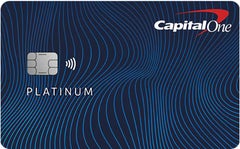First Progress Prestige Secured Mastercard® Credit Card review: Build credit with low interest
This card’s low APR and slightly forgiving terms make it a solid choice for building credit — just watch out for the annual fee.
The Bankrate promise
At Bankrate we strive to help you make smarter financial decisions. While we adhere to strict , this post may contain references to products from our partners. Here's an explanation for .
Snapshot
4.0
Bottom line
The First Progress Prestige is a secured card ideal for building credit, offering a lower-than-average ongoing APR and solid rewards for timely payments. However, it does require a security deposit and charges an annual fee, which may impact its overall value.
Best for low interest
Regular APR
13.49% (V)
Annual fee
$49
4.0
Bankrate score
Cost of membership
Ease of building credit
APR
Features
Why you'll like this: Your security deposit determines your credit limit, allowing you to establish credit and potentially receive lower interest rates than with many unsecured cards.
Reward Details
Card Details
Remove a card to add another to compare
Remove a card to add another to compare
First Progress Prestige Secured Mastercard® Credit Card Overview
The First Progress Prestige Secured Mastercard Credit Card is a secured credit card designed for people with no credit history or poor credit who are trying to get their credit score back on track. The card charges an annual fee of $49, and you aren’t required to meet a minimum credit score for approval.
The primary differences between the three similarly named First Progress secured cards — including the First Progress Select Secured Mastercard® and First Progress Platinum Elite Mastercard® Secured Credit Card — are their annual fees and lower ongoing interest rates. The First Progress Prestige has the highest annual fee, but a 13.49% (V) APR in exchange, which is far below the current average interest rate, even for cardholders with excellent credit.
Ultimately, First Progress’ Prestige card is only worth considering if you’re rebuilding credit and don’t qualify for a no-annual-fee secured card.
-
Rewards
- Up To 10% Cash Back at select merchants with First Progress! Plus, 1% back when you make payments. The 10% cash back rate is available only at a limited number of participating merchants. Offer percentages vary by merchant and are subject to change. See First Progress Rewards Program Terms & Conditions for details.
Expert Appraisal: Good
See our expert analysis -
Rates and fees
- Regular APR: 13.49% (V) APR
- $49 annual fee
- $200 minimum security deposit
- Up to $41 late payment fee
- 3% foreign transaction fee
Expert Appraisal: Typical
See our expert analysis -
Credit-building features
- Soft pull inquiry
- Reports to three major credit bureaus
- Manageable monthly payments
Expert Appraisal: Typical
See our expert analysis -
Other cardholder perks
- Redeem rewards for statement credits
Expert Appraisal: Weak
See our expert analysis
First Progress Prestige pros and cons
Pros
-
The card’s APR is much lower than even many full-fledged credit cards’ rates.
-
An initial deposit of between $200 and $2,000 gives you room to choose your credit limit and keep credit utilization low.
-
The new rewards rate of earning 10% cash back on purchases with participating merchants boosts this card's value significantly.
Cons
-
The annual fee, coupled with an initial minimum security deposit of $200, lowers this card’s affordability compared to some competing secured cards.
-
This card has no intro APR offers on purchases or balance transfers, so you won’t get a break on interest if you end up carrying a balance.
-
The card’s redemption options for rewards are limited.
How to build credit with the First Progress Prestige
To get the most credit-building value out of the First Progress Prestige Secured Mastercard, lean into the card’s unique strengths, which include a low ongoing APR and the ability to report to all three major credit bureaus. You should also consider the following strategies:
- Start with a manageable deposit. Since your credit limit is tied to your deposit, choose an amount that supports occasional use while staying well below your limit — ideally using less than 30% of your available credit to keep your credit utilization low.
- Make small, recurring purchases. Use the card to pay for a fixed monthly bill, such as a subscription service or utility, then pay it off in full. This establishes a positive payment history without running the risk of carrying a balance.
- Pay early if needed to avoid interest. Although the card offers a relatively low APR compared to many secured cards, paying your balance early (or in full) ensures you avoid interest while still benefiting from on-time payments.
- Monitor your credit progress. Track your credit score over time using free tools and look for improvements in your payment history, credit utilization and length of credit history. These are all reported monthly by First Progress.
- Reassess after six to 12 months. With a strong record of responsible use, consider applying for a traditional unsecured card or see if you qualify for another First Progress product with better terms, which will allow you to continue building credit without tying up your deposit.
Why you might want the First Progress Prestige
As far as cards for no credit history or bad credit go, the First Progress Prestige Secured Mastercard is notable for its incredibly low ongoing APR and fast approval process with no hard credit pull.
Rewards rate: Every bit counts
The First Progress Prestige earns up to 10% cash back at select merchants with first progress, plus 1% when you make payments. This kind of reward structure is ideal for a credit-building card since it ties your earnings to establishing good credit habits like paying your bills on time. It also gives those who are new to rewards an easy way to get used to earning and redeeming them, which will come in handy for higher-tier cards.
The 10% cash back rate is available only at a limited number of participating merchants. Offer percentages vary by merchant and are subject to change. See First Progress Rewards Program Terms & Conditions for details.
APR: Much lower than an average secured card
The card’s rock-bottom 13.49% (V) APR is about half the typical interest rate for someone with limited credit. By comparison, the Capital One Platinum Secured Credit Card has no annual fee, but it has an APR of 28.99% (Variable) (See Rates & Fees). While you should avoid carrying a balance with a credit card — particularly if you’re building credit — the low APR should help keep any interest charges low.
Credit building: Standard but essential features
The First Progress Prestige has a few key credit-building features that can help raise your credit score.
You can apply for the First Progress Prestige online with a soft pull on your credit, so there will be no negative impact on your credit score. First Progress also reports to all three major credit bureaus (Experian, Equifax and TransUnion) each month, so you’ll be able to improve your credit standing provided you use your card responsibly.
Why you might want a different secured card
Despite its solid credit-building perks and low interest rate, the First Progress Prestige secured card comes with its fair share of drawbacks. With its potentially low credit limit and myriad fees, this card can cost more than it’s worth.
Credit limit: The limit is quite low
Like most secured cards, your initial security deposit on the card becomes your credit limit. With the First Progress Prestige, this amount can be anywhere from $200 to $2,000. Keeping a low credit utilization ratio helps improve your credit score, but maintaining a low ratio is more challenging with a lower credit limit. The general guideline is to keep this ratio under 30%, but the minimum $200 credit limit means you’ll need to keep your balance below a mere $60.
This detail is important since the annual fee will eat into your credit limit when you first open your account and when it’s charged each year. If you start with the minimum $200 credit limit, you’ll actually have just $151 available on your card in your first billing cycle, with very little spending power before you reach above 30% on your credit utilization ratio.
Rates and fees: A few caveats to keep in mind
If you’re interested in the First Progress Prestige’s low APR because you’ll carry a balance from time to time, you should be aware of the card’s other fees. The $49 annual fee is expensive compared to other cards of its caliber and generally a negative to have on a credit building card unless you have few alternatives. The card also charges up to $41 if you’re late in your payment, which can add up quickly if you fall behind on payments.
Finally, if you can’t pay your bill online or you’re worried your payment will be posted too late, you can make an expedited telephone payment in exchange for a $10 fee. There is also a $1 fee if you ever need a copy of a billing statement over six months old.
Redemption: Limited options for rewards and low earning rate
You can only redeem the rewards you earn with the First Progress Prestige as a statement credit. Once you’ve earned a minimum of 500 rewards points or $5 worth of earnings, you’ll be able to redeem your points for a statement credit toward your card balance.
How the First Progress Prestige compares to other secured credit cards
The Prestige is a more practical and possibly easier-to-obtain way to build credit with a card compared to other options like store credit cards. But its steep $49 annual fee is also noteworthy when other secured credit cards offer more effective features for no yearly cost.

Annual fee
Intro offer
Rewards rate
Up To 10% Cash Back on Purchases + 1% on Payments^^.
Recommended Credit Score
A FICO score/credit score is used to represent the creditworthiness of a person and may be one indicator to the credit type you are eligible for. However, credit score alone does not guarantee or imply approval for any financial product.

Annual fee
Intro offer
Rewards rate
Recommended Credit Score
A FICO score/credit score is used to represent the creditworthiness of a person and may be one indicator to the credit type you are eligible for. However, credit score alone does not guarantee or imply approval for any financial product.

Annual fee
Intro offer
Intro Offer: Unlimited Cashback Match for all new cardmembers—only from Discover. Discover will automatically match all the cash back you’ve earned at the end of your first year! There’s no minimum spending or maximum rewards.
Rewards rate
Earn 2% cash back at Gas Stations and Restaurants on up to $1,000 in combined purchases each quarter, automatically. Earn unlimited 1% cash back on all other purchases.
Recommended Credit Score
A FICO score/credit score is used to represent the creditworthiness of a person and may be one indicator to the credit type you are eligible for. However, credit score alone does not guarantee or imply approval for any financial product.
Is this card right for me?
The First Progress Prestige Secured Mastercard is notable for its incredibly low ongoing APR and fast approval process with no hard credit pull. It could prove a good fit if:
- You don’t qualify for a secured card that doesn’t carry an annual fee.
- You want to build credit without distraction, as you won't have to worry about welcome bonuses or features that encourage spending on big purchases.
- You typically carry a balance, as this card could work in your favor due to its very low ongoing interest rate.
Alternative picks
The First Progress Prestige Secured Mastercard Credit Card could be a decent choice for building credit, but its perks don't offset enough of the annual fee compared to other popular secured credit cards. You can find secured cards from major issuers with lower upfront deposits, higher initial credit limits and more lucrative reward programs.
Frequently asked questions
How we rated this card
Our proprietary card rating system takes into account a mix of factors when scoring credit cards for students and people building credit, including each card’s cost, APR, credit-building tools and more.
We analyzed over 50 of the most popular cards designed for students and people with no credit history, bad credit or a fair credit score and scored each based on where its key features stood in relation to others in its category.
Here are some of the key factors that gave this card its score:
* See the online application for details about terms and conditions for these offers. Every reasonable effort has been made to maintain accurate information. However all credit card information is presented without warranty. After you click on the offer you desire you will be directed to the credit card issuer's web site where you can review the terms and conditions for your selected offer.
Editorial Disclosure: Opinions expressed here are the author's alone, and have not been reviewed or approved by any advertiser. The information, including card rates and fees, is accurate as of the publish date. All products or services are presented without warranty. Check the bank’s website for the most current information.












